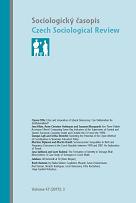Socioeconomic Inequalities in Birth and Pregnancy Outcomes in the Czech Republic between 1990 and 2007: An Exploration of Trends
Socioeconomic Inequalities in Birth and Pregnancy Outcomes in the Czech Republic between 1990 and 2007: An Exploration of Trends
Author(s): Martina Štípková, Martin KreidlSubject(s): Social Sciences
Published by: AV ČR - Akademie věd České republiky - Sociologický ústav
Keywords: health inequality; child health; birth weight; post-socialist transformation; Czech Republic
Summary/Abstract: This article explores the impact of the post-socialist transformation of Czech society on the health of newborns from different socioeconomic groups. The authors used six different measures of child health—various constructs based on birth weight, length of gestation, and vitality—as dependent variables and the mother’s educational attainment as the key predictor. They used birth certificate data on all singleton births in 1990, 1992, 1994, 1996, 1998, 2000, 2002, 2004 and 2007 (N=912 591). They estimated a series of random-intercept multi-level models and report the observed trends in health inequality by maternal education. The analysis consistently and persistently showed large gaps in health between children born to mothers with elementary education on the one hand and all other children on the other hand. While the trends are not entirely congruent across all measures of child health, the authors found more evidence of growing inequality than of declining or stable inequality. Inequality grew most in the 1990s and then stabilised or even declined. They offer two tentative explanations for observed growth in inequality: the selective adjustment hypothesis and the selective childlessness hypothesis.
Journal: Sociologický časopis / Czech Sociological Review
- Issue Year: 47/2011
- Issue No: 03
- Page Range: 531-564
- Page Count: 34
- Language: English

